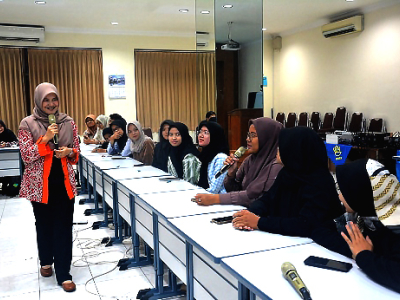UNY students learn local wisdom in science learning with Assist.Prof. Dr. Roseleena Anantanukulwong

Assist. Prof. Dr. Roseleena Anantanukulwong from the Faculty of Science Technology and Agriculture, Yala Rajabhat University, Thailand, gave a public lecture to UNY Science Education students. Dr. Roseleena Anantanukulwong was a guest lecturer at the Faculty of Mathematics and Natural Sciences UNY at the Science Education Department.
"Local wisdom is a collection of knowledge obtained from a series of activities, such as observing, analyzing, interpreting, and reaching conclusions. Local wisdom is a collection of knowledge resulting from thoughts and actions carried out by the community in a place (area) or location," said Roseleena.
"To make local wisdom as a learning material, it is necessary to have a scientific explanation (concept science) about the cultural phenomena around students (local wisdom). Another opinion says that creating a learning environment can help students understand the relationship between their life-world and what they learn at school. With local wisdom, students can learn cultural values that can influence attitudes, behavior, and thinking skills," she said.
There are still very few teachers who integrate their local wisdom with science learning. One of the reasons often mentioned is the lack of learning examples and ways to incorporate them. How to design local insight for science classes can be done in several ways. The first is to conduct in-depth interviews with local experts, then conceptualize science to fit the local wisdom. The next step is teaching design. Choose teaching methods that are responsive to local knowledge. Next is implementation and assessment. And finally, an active learning and formative assessment of learning progress in science concepts.
"Science teachers can also incorporate local wisdom into classroom management and community-building practices. For example, implementing circle practices, where students sit in a circle and talk, can help create a more inclusive and respectful classroom environment. "Talking stick," used in some indigenous cultures to point to people who have opinions during discussions, can be adapted for use in the classroom to encourage respectful communication," she said. (Author: Witono, Editor: Dedy, Tj.Lak)

